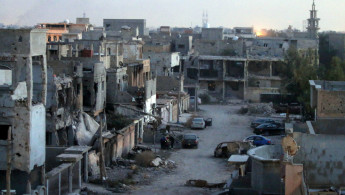No way out: Besieged Benghazi residents trapped in conflict
Hundreds of Libyan and foreign nationals are trapped in a Benghazi neighbourhood, in eastern Libya, amid fighting in the city.
Humanitarian watchdog, Amnesty International said that after months of clashes around 130 families and many foreigners in Ganfouda, a southwestern neighbourhood of Benghazi, were locked in with dwindling food and fuel supplies.
"As the airstrikes intensify and the fighting moves ever closer, many people are too afraid to leave their homes. We are urging all parties to the fighting in Benghazi to respect international humanitarian law and allow unfettered access to humanitarian relief for civilians in need," said Magdalena Mughrabi, deputy director of Amnesty's Middle East and North Africa programme.
"Those who wish to leave must be protected from any attacks based on where they are from or their perceived political affiliation."
Amnesty has called for the creation of safe corridors to evacuate civilians trapped in Ganfouda.
Benghazi has been plagued by violence since 2014 when forces loyal to former general Khalifa Haftar began a campaign against armed groups in the city.
 |
Those who wish to leave must be protected from any attacks based on where they are from or their perceived political affiliation |  |
Although Haftar – who is supported by British, French, and US military advisors and special forces – has exerted control over much of Benghazi, Ganfouda remains one of few districts where militant factions have maintained a strong presence.
Groups opposing Haftar’s forces, include military factions loyal to al-Qaeda and the Islamic State group, who formed a coalition known as the Shura Council of Benghazi Revolutionaries (BRSC), are positioned in Ganfouda.
"Constant bombing" and food shortages
Earlier in the week, the UN's Special Representative for Libya Martin Kobler said those trapped in Ganfouda "are facing constant bombing and shortages of food, medical care and electricity".
Speaking to The New Arab Mouna Elkekhia, a researcher with Amnesty International, said that both sides in the fighting had committed human rights abuses that in certain cases "amounted to war crimes".
"There have been cases of torture of civilians, abductions."
One particular example concerns the well-being of a group of former prisoners who Amnesty has previously said the BRSC could be using as "human shields" in Ganfouda.
Around 130 men were abducted by the BRSC affiliated Ansar al-Sharia from the Budheima military prison in October 2014. Most stood accused of having fought with pro-Qaddadi forces.
 |
We are urging all parties to the fighting in Benghazi to respect international humanitarian law and allow unfettered access to humanitarian relief for civilians in need |
 |
In addition to Libyan nationals Elkekhia said that a number of Sudanese, Bangladeshi, and Chadian migrant workers that had previously moved to Ganfouda to escape other areas of the city caught up in fighting were now also trapped in the area.
Speaking to the Al-Nabaa TV station on Wednesday Fatima al-Barasi, a Ganfouda resident, described the situation in the besieged district as "brutal".
Appealing to the UN to intervene al-Barasi said that shelling on the area had resulted in the destruction of "countless buildings” adding that local residents had been “suffering from hunger, thirst and sickness for two years".
No way out
"We're living like animals," another resident whom Amnesty identified as Samir said speaking to the humanitarian watchdog.
Residents have taken to hosting displaced families whose houses were destroyed by airstrikes and shelling.
Many residents are also afraid that, if they were to leave the area, they could face reprisals from Haftar’s National Libyan Army forces under the pretext that they are supporters or sympathisers of those military groups that hold sway in Ganfouda.
"People need to be assured that if they leave nothing will happen to them," said Elkekhia.
 |
People need to be assured that if they leave nothing will happen to them |  |
Since the toppling of Muammar Gaddafi in 2011 internal divisions within the north African state have lead to the rise of competing governments and the proliferation of rival militias competing over territory and influence.
In the coming week France is set to host a critical meeting on Libya, which will be attended by representatives from Egypt, Qatar, the United Arab Emirates and Turkey.
The talks are aimed, in part, at bringing Haftar to the negotiating table with Libyan Prime Minister-designate Fayez al-Sarraj.
Sarraj's Government of National Accord (GNA) was formed in March after a UN-backed deal last September.
However, although it is backed by the international community, Haftar and his forces who have have a strong presence in eastern Libya have rejected its authority. Instead Haftar supports a rival government centred in Tobruk, in eastern Libya.
In September forces loyal to Haftar took control of Libya's so-called "oil crescent" from government forces who have been fighting Islamic State group militants in Sirte.
Speaking last week in Paris after talks with French President Francois Hollande Sarraj said that Haftar should be given a position within a new, more inclusive government. But the Libyan Prime Minister designate said the decision was motivated by necessity as much as by choice.
"We have no other choice but dialogue and reconciliation," Sarraj told AFP. "No one wants an escalation or a confrontation between Libyans."



